 Welcome to the Farms "The Blade of Grass" Welcome to the Farms "The Blade of Grass"
The philosophy of the Company :
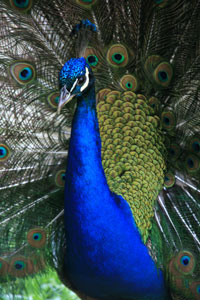 - Ethics… Responsible citizens… for a sustainable world - Ethics… Responsible citizens… for a sustainable world
Biodiversity: a value to be preserves. Let's play at sustainable tourists
- Scientists on the Farm: from theory to practice, we arrange and plan experiences of physical and natural mathematical sciences with the teachers. Levers, honeycomb hexagons, phyllotaxis…
- Imagination and Beauty in touch with nature… art with nature…
- Biblical plants on the Farm…
Proposals for cooperation with Nature:
- Project "The Field": the opposite of total control
- "Gardens in Movement" restores Nature's possibility of expressing herself according to her inner order. Hurray for Wandering Plants!
- "The Planetary Garden": who is the Gardener? A Planetary Citizen.
Our farms "Il Filo d'Erba" are open to whoever is curious "by Nature".
Latins translated with "Natura" (contraction of "Nascitura", who's going to be born) the Greek term Physis, F?s??, which contains the indo-european root "bhu - be" related to the root "bha -light".
Φυσις is the Whole generating itself to come to life; it contains in itself its origins, "being illuminated", it is visible and understandable.
We all are part of the Φυσις, of the Whole: our actions influence and modify the Φυσις, and anything happening in the Φυσις influences and modifies in turn ourselves.
The Whole, the Φυσις, evolves following a proper internal order, resulting from the interactions among all its constituents.
The effects of our behaviour fall back on ourselves. We need to re-approach the Φυσις which encloses us, AS it is necessary to regain an authentic relationship with beings and things with whom we share our life.
I felt the need to take a path of discreet observation of the vegetal and animal world.
Moving forward from this knowledge I hope a more genuine relationship could ensue, in harmony and balanced with the Whole of which we are part.
To this extent many areas in our Farms "Il Filo d'Erba" are laboratories purposing to gain knowledge of the Φυσις, "disorderly" spaces, where the Φυσις takes care of itself, where anything might happen.
Many are the animals living freely, both domestics and wild, and many are the "vagrant" types of grass, planets of a system continuously moving towards an equilibrium, a harmony to which we are bound to participate not in antagonism but as part of a synergic competition.
I have a dream:
From nature to people without mediation, free to interpretation.
Within the two farms of ‘Il filo d’erba’ (blade of grass) there is the forthcoming of life. “Where everything is yet to happen or germinate, telling all to listen and not to miss a breath or whisper of nature. When nature is left unaltered it creates areas of paradise. ‘Paradise’ comes from the Persian word ‘Parsi’ meaning garden or park.” –From the project: ‘The game tent’, Cisgiordania – Israel
Ancient people called grape vines “cosmic trees” because it was said they embraced the sky. Even now, for those who live in the country side and who are endowed with a vivid imagination it is easy to see the truth behind this poetic fantasy. A sight most of us have lost touch with. At the edge of the regional park of ‘Euganean hills’, 13ms high at the top of a chestnut tree on Monte Ceva you’ll find the tips of the vines from the neighbouring vineyard. These vines, free to roam as they please, thread their way through the trees like a cobweb enclosing the sky. This magic can also be admired among the elms and willows in Altaura in the lower hills of Padova.
What a nice, natural garden. The seeds of last year’s radishes fallen, unplanned and are free to reproduce in the orchard. We didn’t sow the radishes, we didn’t water them, we didn’t tend to them and other herbs have grown amongst them. It is wonderful to see nature’s ability to regenerate itself!
What a joy it was for the children one Easter to see two lambs, free range on the farm, come into the dining room through the open door to wish all a Happy Easter. It was a very special Easter!
There was a lot of emotion on the farm one day when we all saw the mother peacock unexpectedly come into view with her two newborn chicks after 28 days of hiding, (most likely in the vineyard) waiting for her eggs to hatch!!!
At Altaura there is the “Lovers Avenue”. Here we can admire and learn about the spontaneous shapes of plants and trees, grown out of seeds sewn into the ground by me, without pruning or grafting. These plants are left to do as they wish and can indulge themselves as much as they like. This freedom and capacity to grow has lead me to call this place ‘Lovers Avenue’. To love means to open your heart, body and soul to another, embracing his own and widening your dimension and letting others grow with you. In this way, we, like the plants, can find our own space and way of being, growing and finding new paths as we please…we do not interfere with the plants … “che di natura è frutto ogni vostra vaghezza!” – Giacomo Leopard- All is left natural, liberal, without direction or limitations.
Naturally, without mediation, the small clods of earth with brass and flowers become our precious ornaments for the table.
In Altaura there is a six metre tall Pear tree, perhaps even taller, which by the end of August is full of big ripe pears. It is wonderful to see such a sight! Even the pears reach all the way to the top!
Do you know the etymology of the word ‘fegato’ (Italian for Liver)? Generally the names of organs in the body are derived from either Greek or Latin roots. ‘Fegato’ however does not appear to derive from the Latin: jecur or the Greek: epar. An assumption could be made that the word ‘fegato’ (liver) is borrowed from the Latin word ficatus (meaning fig). Farmers used to feed geese with figs to swell their livers for paté. In this case it would seem that farming traditions were stronger in the naming of the organ.
…Yesterday I saw a flock of geese greedily eating Figs from a tree. The Fig tree unaltered (not pruned) had figs at a low enough level for the geese to eat them directly from the trees. I thought how funny and appropriate to name the liver ‘fegato’, from the fig ‘ficatus’.
I hope that by visiting the farms of ‘Il filo d’erba’, where nature explodes, you take away an experience of wonder and enjoyment, with a fuller heart and new ideas. I wish to share this with all because I believe we need a bit of poetry and child-like wonder in our lives and I am convinced that those that visit these farms will leave with a greater appreciation for nature and have a greater inclination to defend it when it comes up in issues of biodiversity, sustainability and accountability. I believe one of the tasks of those fortunate enough to have a strip of nature is to share it with others and to love and respect it just the way it is..
Maria Dalla Francesca
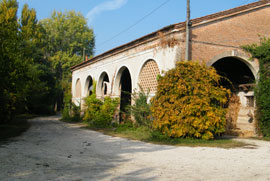
Location at "Altaura"
Via Correr 1291, loc. Altaura
35040 Casale di Scodosia, Padova
Tel: +39 3472500714 – +39 0429 870005 |
► Casale di Scodosia at via Correr 1291 the locality of Altaura.
The Agritourisme Casale di Scodosia
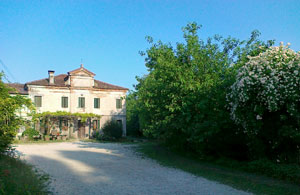
is an ancient farmland with 26 hectares of land cultivated according to the method of organic agriculture which offers to visitors big and small the possibility to discover the traditional life of the farmer, the fields, and the animals of the farm. The creeks and hedges create a healthy and luxuriant vegetative zone which is an oasis for wildlife. A forest of ash, oak, walnut, hazelnut, and paulownie cover half of the farm’s acreage. An entire hectare is cultivated solely for the support of wild animals.
Wheat, corn, soy, and medicinal herbs are cultivated on twelve hectares. Sheep find refuge under the kiwi trees, where geese andchickens nest as well. The donkeys and cows preferthe shade of the paulownietrees, and the rabbits have their pens outin the open air. We canobserve from the safety of a special screened shed the queen bee, her drones, and the worker bees; and even taste the honey directly from the hive. Baby donkeys, cows, rabbits, piglets, chicks, lambs, and goat kids are friendly to petand hold in your arms. Or, learn the art of weaving on an ancient loom using the traditional tools.
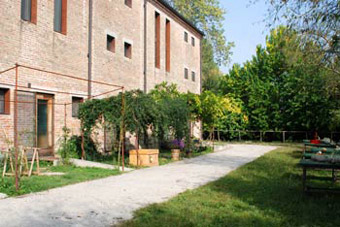
The Farm also offers studies in greater depth and laboratories on specific topics such as the biodiversity and the safeguard of seeds; the well-being of animals and coop construction also for chickens, turkeys, and guinea fowl; biotechnology and the biomass boiler; and all about the insects that populate an organic farm.
As for hospitality, besides the outdoors space there are the rustic annexes of the seventeeth-century Villa Correr: the restored old stalls; the grand portico housing all the harvest tools; and the ex-“essicatoi”, buildings where massive tobacco bales were once dried, which have been recently restored with all the modern conveniences necessary for a comfortable stay, including lodging with private bathrooms and a banquet room for meetings and events all decorated with simple and familiar taste.
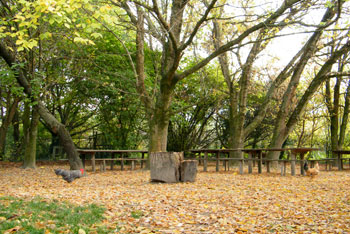
|
|
|
